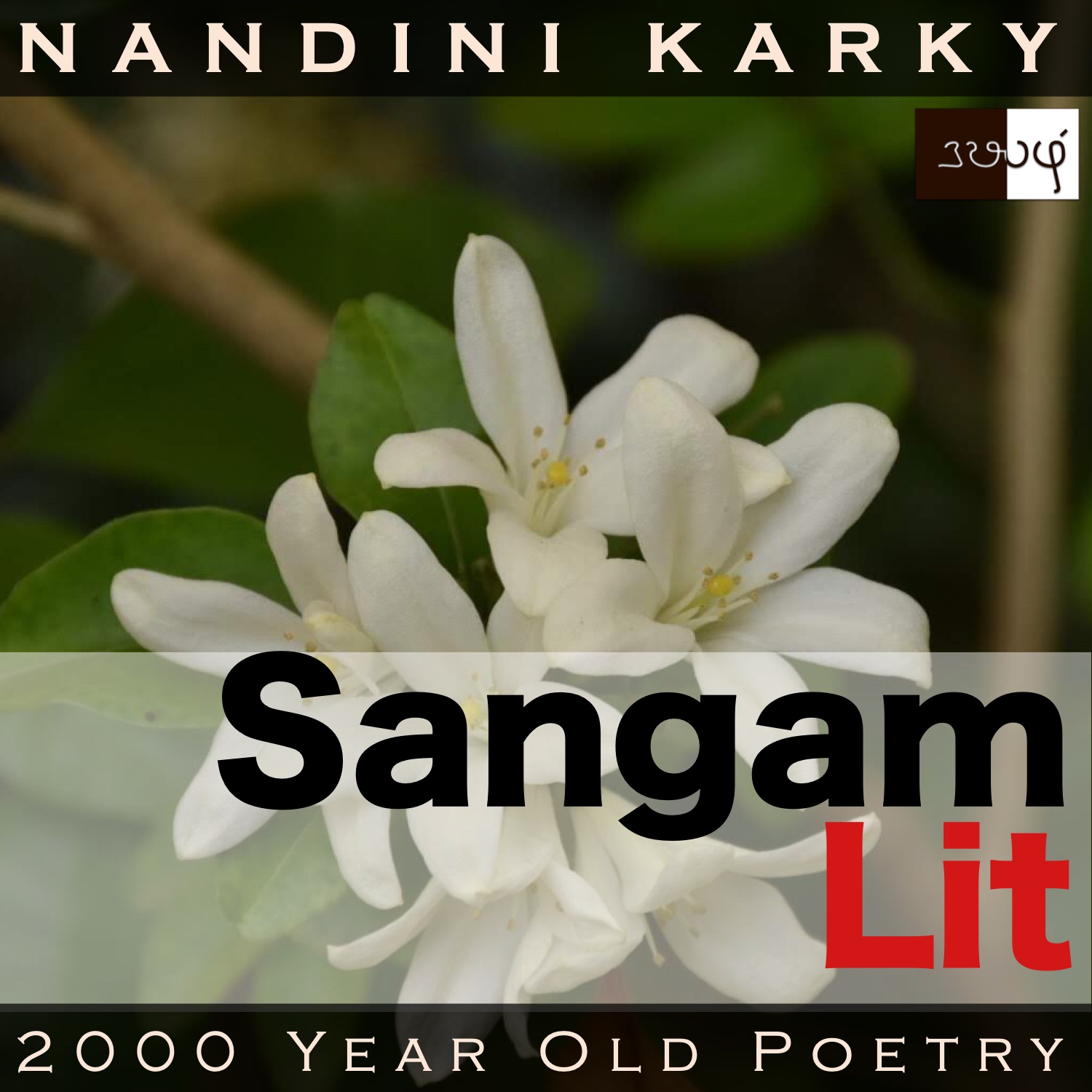Podcast: Play in new window | Download
Subscribe: Apple Podcasts | Spotify | Amazon Music | Android | iHeartRadio | TuneIn | RSS | More

In this episode, we listen to how a man’s words to a flower echoes his deep feelings, as portrayed in Sangam Literary work, Kurunthogai 162, penned by Karuvoor Pavuthiranaar. The verse is situated in the forest regions of ‘Mullai’ and speaks in the voice of the man to a wild jasmine, as he returns homeward after completing his mission.
கார் புறந்தந்த நீருடை வியன் புலத்துப்
பல் ஆ புகுதரூஉம் புல்லென் மாலை-
முல்லை! வாழியோ, முல்லை!-நீ நின்
சிறு வெண் முகையின் முறுவல் கொண்டனை;
நகுவை போலக் காட்டல்
தகுமோ, மற்று-இது தமியோர்மாட்டே?
‘Why the smile, O wild jasmine’ asks this verse. The opening words ‘கார் புறந்தந்த நீருடை வியன் புலத்து’ meaning ‘the wide lands filled with moisture and protected by rain clouds’ is a one-line portrait of a forest’s features. Next, we see animal life in ‘பல் ஆ புகுதரூஉம்’ meaning ‘many cattle enter their barns’. ‘சிறு வெண் முகை’ bring before our eyes ‘the little white buds’ of a jasmine. This is followed by mention of ‘a smile’ in ‘முறுவல் கொண்டனை’ as well as ‘நகுவை போலக் காட்டல்’ meaning ‘looking as if you are laughing’, detailing the stages of mirth. Ending with the words ‘இது தமியோர்மாட்டே’ meaning ‘to those who are lonely’, the verse welcomes us to listen with empathy.
Who could be smiling and laughing all together? The context reveals that the man and lady were leading a happy, married life, when the man had to part away from her to go on a mission. Seeing the lady worried, the man promises to return before the rainy season. After he finishes his mission, the man rushes homewards and on the way, he sees a wild jasmine flower and says to it, “In the moist, wide spaces sheltered by rainclouds, when many a cattle return home in this lightless evening, O wild jasmine, may you live long, with your little, white buds, you are smiling. Is it right to appear as though you are laughing at those who are all alone?” With these words, the man expresses his remorse at returning late to his lady in an indirect manner.
Words to this wild jasmine waft with a deep scent, indeed! The man starts his conversation with the flower by talking about the land in which it blooms. He mentions the denseness of the forests that are nurtured by the moisture of the rain bearing clouds, rendering a mini-geography-lesson. Then, he marks the time of the day by pointing to cattle returning from the day’s graze and entering their barns in the village homes, no doubt, talking about the evening hour. In such a dim evening, there’s a flash of light and the man locates it as the shine of the blooming wild jasmine flowers and asks it, shaking his head, whether it was right on the part of that jasmine to smile with its buds, because to those who are separated from their beloved, it would seem as if the flower is rendering a humiliating laugh!
All that the man saw was a flower doing what all flowers do, which is to open its buds and spread their fragrance to the world around. But, to the man, it appears not only as if this flower is smiling, but as if it’s laughing at him. He may talk about ‘those who are separated’ in third person but we know well that he means himself. To see a flower and think it’s smiling is something that would have occurred to anyone with a sense of observation, when in a happy mood. Here, the man goes a step further and sees the flower as if it’s laughing at him. When we ponder on the ‘why’, it will become apparent that the man is feeling guilty for returning late, because he promised to be back before the rainy season, and here, the wild jasmine blooming brightly surely indicates the arrival of that very season. It’s his guilt at returning late and leaving his lady in much suffering that makes him see the innocent flower as if it’s mocking him. Many of us would have felt this same emotion, when in a negative frame of mind, having mistaken the meaningless laughter of those around us, as if it was laughter pointed at us. Objects may change, words may change, but emotions remain the same, illustrates this luminous verse from two thousand years ago.




Share your thoughts...